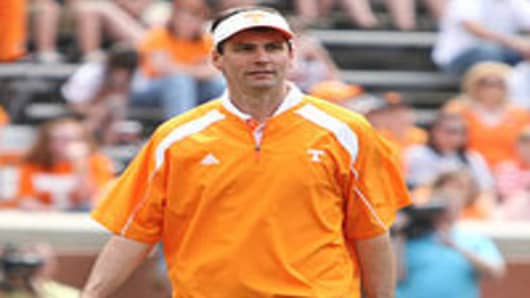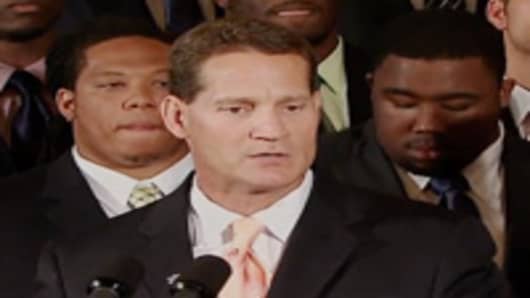The latest symbol of the college football arms race is not the coaches' salaries themselves but rather the money that university officials are spending to buy out those huge contracts when a coach falters.
After Tennessee fired its coach last week, the university's chancellor said the athletic department would forgo $18 million in contributions it was to make to the university over the next three years for academic scholarships and fellowship programs.
Instead, some of the money will be used to pay the severance packages of the coach, Derek Dooley, who is owed $5 million, and his staff, which is owed a reported $4 million if it is not retained. Dooley had four years remaining on his contract.
On Sunday, Auburn fired its coach, Gene Chizik, two seasons after the Tigers went unbeaten and won the national championship. Auburn said it owed $11 million in buyouts to its coaching staff, including $7.5 million to Chizik, who had three years left on his contract. He is to be paid $208,334 a month for the next 36 months. The money could have been used to fund other sports.
"It's shameful," said Raymond D. Sauer, chairman of the department of economics at Clemson University and president of the North American Association of Sports Economists. "We can understand the market forces at work, but all that money being burned up that way is a high cost of doing business."
Sauer said there was "a gusher of money" in the Southeastern Conference. "But it's limited," he added.
Coaches' salaries have soared in recent years at colleges throughout the country, often reaching several million dollars a year, as university officials have intensified efforts to claim some of the sport's growing riches that come from billion-dollar television contracts, merchandise sales and alumni contributions. (Read more: Most Expensive College Football Tickets)
But college officials do not seem encumbered by the large contracts; rather, they appear willing to pay the coaches handsomely to go away and make room for new hires — despite little evidence that coaching changes generally result in better teams.
The University of Houston forced its offensive coordinator to resign after one game. After two games, Wisconsin dumped its offensive line coach.
"The pressure has gotten out of control to win," said Bradley Dale Peveto, whose contract was terminated last week after four seasons at Northwestern State of Louisiana.
Over the past decade, about 1 in 10 universities at the major college level replaced their head football coaches annually for performance-related reasons. But a recent study suggests that replacements do not tend to make underperforming teams much better in subsequent seasons and frequently make them worse.
Anecdotal evidence and scientific analysis indicate that replacing a coach is no guarantee of success. Houston finished 5-7 this season after changing its coordinator. Wisconsin is a middling 7-5 after firing its line coach. The Badgers reached the Big Ten Conference title game only because N.C.A.A. penalties left Ohio State and Penn State ineligible. (Read more: Football Team Gets Big Payday Just to Show Up)
A study published last month in Social Science Quarterly may provide sobering news to Auburn, Tennessee and other universities that have fired their coaches. Using data from 1997 to 2010, the study compared the performance of major college teams that replaced their coach with teams with similar records that kept their coach.
The results, tracked over a five-year period following the coaching changes, might surprise many. The lowliest teams subsequently performed about the same as other struggling teams that did not replace their coach. Mediocre teams — those that won about half their games in the year before a coaching change — performed worse than similar teams that did not replace their coach.
The reasons for this are not clearly understood, but may stem from an adjustment period required by a coach at a new university, the time players need to learn a new system and disruptions made to recruiting networks, said E. Scott Adler, an associate professor of political science at the University of Colorado and the lead author of the study.
Statistically speaking, Adler said "There's not much to be said for every few years dumping a coach who's had a couple bad seasons. In the long run, you are about in the same situation down the road if you had done nothing and ridden out the storm."
Adler's own university recently fired its coach, Jon Embree.
There are exceptions, of course, which lend urgency to efforts by fans and administrators to throw out one coach and bring in another. Auburn measures itself against a fierce intrastate rival, Alabama, which is seeking its third national title in four seasons after hiring Nick Saban at a hefty salary that has reached $5.5 million per season, the highest in the country.
Universities view football as a kind of front porch to their campuses, drawing attention in a way that no other endeavor can. Administrators are increasingly reliant on football to support other sports and try to spur donations at a time when the vast majority of universities lose money on athletics. Desperation to win has increased as universities chase the payouts from billion-dollar television contracts.
Some football coaches have become the highest-paid employees of their states. The average salary for a head coach at a big-time university is $1.64 million, an increase of more than 70 percent since 2006, according to an analysis by USA Today.
Auburn expected better results from Chizik's team this season. The Tigers were 3-9, including an 0-8 record in the Southeastern Conference and an embarrassing 49-0 loss to the Crimson Tide. Reports of an N.C.A.A. investigation into possible rules violations also have surfaced in the news media.
"This could be a prophylactic move by Auburn — we know what's coming, let's get on the front end of this and maybe lessen sanctions," said Robert H. Lattinville, chairman of the sports division of the law firm Stinson Morrison Hecker, which represents numerous coaches.
Chizik's firing comes at a time of growing scrutiny of coaches on talk radio and cable television; rising costs for tickets, TV packages and merchandise; and increased access by fans to administrators via social media.
"People have gotten impatient for a lot of reasons," Lattinville said. "They want more immediate results."
At the college sports level, Lattinville said, "you can't fire the players," so the coach takes the fall for a lack of success. "It sends a message to the fan base and recruits that this is important, we're trying, we're doing something."
At Tennessee, the chancellor, Jimmy G. Cheek, said the university would try to make up for the loss in academic funding through private contributions — a scenario that has raised concerns among faculty members.
"My long-term concern is the arms race for coaches' salaries," said Toby Boulet, an associate engineering professor and a former president of Tennessee's faculty senate. "If athletics are going to remain self-supporting in Knoxville, we're going to have to find a way to be successful and fund that. I'd like to see the budget set up so that if the football team encounters a rocky patch, scholarships don't go away."
This story originally appeared in The New York Times. Read the full story here.



